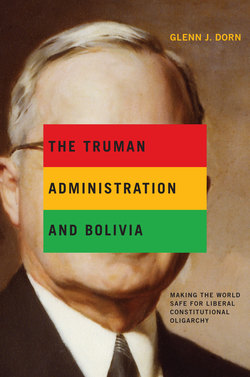Читать книгу The Truman Administration and Bolivia - Glenn J. Dorn - Страница 7
На сайте Литреса книга снята с продажи.
ОглавлениеACKNOWLEDGMENTS
In writing The Truman Administration and Bolivia, I have enjoyed the support of more friends, family members, mentors, and colleagues than I could ever deserve. Without them, this project could never have been realized.
I would like to begin by thanking the teachers and historians who taught me what I know of the historian’s craft. I owe my career in this profession to Michael Hogan, whose patience and skill as a mentor cannot be overstated. The lessons that he, Peter Hahn, Warren Van Tine, and my other professors at Ohio State University taught me were invaluable. William O. Walker III has, quite literally, been there for me from my first day as an undergraduate. As a freshman chemistry major, I was blessed to attend his 8 a.m. U.S. history class. His passion and skill as a teacher, along with that of David Steigerwald and Richard Spall, drew me to the field of history and convinced me to make a career of it. I have continued to call upon Bill’s wisdom and advice ever since. My first day of teaching was as a one-year replacement for him, and I took it as my mission to do for my students what he had done for me. I remind myself of that every semester and attempt to rise to that near-impossible challenge each year.
This project presented new challenges for me, and I am grateful for all of those who lent me their expertise. The archivists at the U.S. National Archives, the Harry S. Truman Presidential Library, the Franklin Delano Roosevelt Presidential Library, and the George Meany Memorial Archives in Washington, D.C., were, as always, invaluable in my research and a credit to their great profession. Martha Paredes in La Paz and Carlos Dellapiane in Buenos Aires had the more challenging task of helping me find what I needed in their archives. Both showed more patience and dedication than I had any right to ask for. Before and during my trip to La Paz, James Siekmeier and Thomas Field provided insight and assistance that added much to the venture. Donald Burge at the University of New Mexico went far above and beyond the call of duty to ensure that I was able to access Senator Chavez’s records. The staff at Penn State University Press deserve special recognition for their skill, professionalism, and patience. I cannot thank enough Sanford Thatcher, Kendra Boileau, Laura Reed-Morrisson, Stephanie Grace, and the rest of the PSUP staff, as well as copy editor Jeffrey H. Lockridge, for the time and effort they spent to improve my work and shepherd it to publication.
I also want to thank my colleagues at Embry-Riddle Aeronautical University (ERAU). James Libbey has been a mentor since I arrived in Daytona Beach and has been my model for how to balance teaching and research. I aspire to excel at each, as he did. Steve Craft contributed to this work more than he can know. Whenever I reached a difficult point in the research and writing, Steve’s suggestions and comments unfailingly pointed me in the right direction. Lynnette Porter has been not only a great friend but also the toughest, most diligent editor I have ever run across. Donna Barbie of the Humanities and Social Sciences Department, Dean Bill Grams, Chief Academic Officer Richard Heist, and President John Johnson ensured that I had the time and money I needed to fulfill some ambitious research and travel goals. That they did so in difficult financial times only adds to the debt I owe them. My colleagues and students at ERAU have made it nothing less than a home for me, and for that I am deeply grateful.
And, finally, my special thanks to Jeff, Kathy, and Gary Dorn and my eternal gratitude and sincerest apologies to Mary and Cassandra for enduring this project over the last several years. Without their patience, love, and support throughout, nothing would have been possible.
